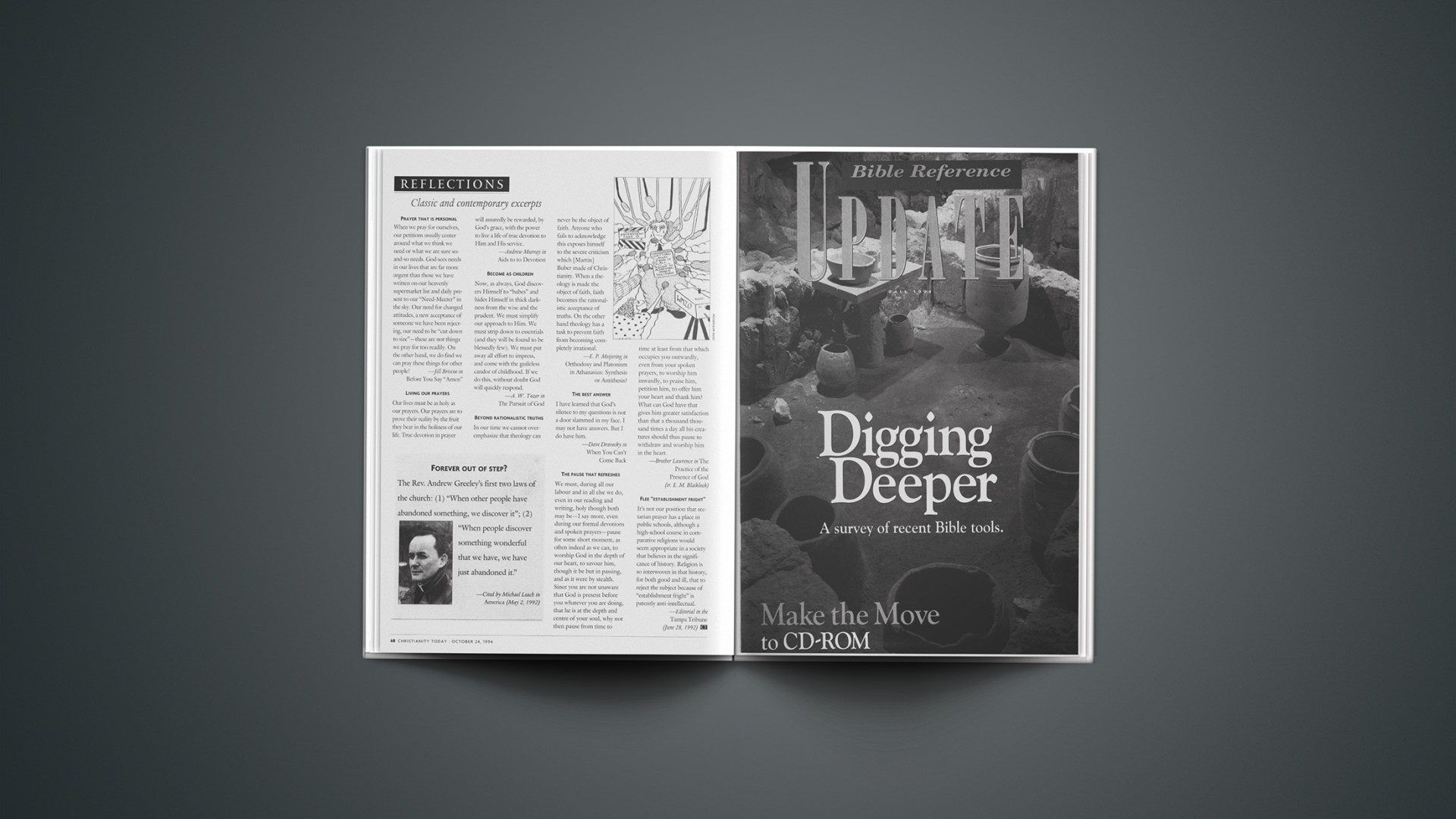REFLECTIONS: Classic and contemporary excerpts
FOREVER OUT OF STEP?
The Rev. Andrew Greeley’s first two laws of the church: (1) “When other people have abandoned something, we discover it”; (2) “When people discover something wonderful that we have, we have just abandoned it.”
– Cited by Michael Leach in
“America” (May 2, 1992)
PRAYER THAT IS PERSONAL
When we pray for ourselves, our petitions usually center around what we think we need or what we are sure so-and-so needs. God sees needs in our lives that are far more urgent than those we have written on our heavenly supermarket list and daily present to our “Need-Meeter” in the sky. Our need for changed attitudes, a new acceptance of someone we have been rejecting, our need to be “cut down to size”-these are not things we pray for too readily. On the other hand, we do find we can pray these things for other people!
– Jill Briscoe in
“Before You Say ‘Amen’ “
LIVING OUR PRAYERS
Our lives must be as holy as our prayers. Our prayers are to prove their reality by the fruit they bear in the holiness of our life. True devotion in prayer will assuredly be rewarded, by God’s grace, with the power to live a life of true devotion to Him and His service.
– Andrew Murray in
“Aids to Devotion”
BECOME AS CHILDREN
Now, as always, God discovers Himself to “babes” and hides Himself in thick darkness from the wise and the prudent. We must simplify our approach to Him. We must strip down to essentials (and they will be found to be blessedly few). We must put away all effort to impress, and come with the guileless candor of childhood. If we do this, without doubt God will quickly respond.
– A. W. Tozer in
“The Pursuit of God”
BEYOND RATIONALISTIC TRUTHS
In our time we cannot overemphasize that theology can never be the object of faith. Anyone who fails to acknowledge this exposes himself to the severe criticism which [Martin] Buber made of Christianity. When a theology is made the object of faith, faith becomes the rationalistic acceptance of truths. On the other hand theology has a task to prevent faith from becoming completely irrational.
– E. P. Meijering in “Orthodoxy and Platonism in
Athanasius: Synthesis” or Antithesis?
THE BEST ANSWER
I have learned that God’s silence to my questions is not a door slammed in my face. I may not have answers. But I do have him.
– Dave Dravecky in
“When You Can’t Come Back”
THE PAUSE THAT REFRESHES
We must, during all our labour and in all else we do, even in our reading and writing, holy though both may be-I say more, even during our formal devotions and spoken prayers-pause for some short moment, as often indeed as we can, to worship God in the depth of our heart, to savour him, though it be but in passing, and as it were by stealth. Since you are not unaware that God is present before you whatever you are doing, that he is at the depth and centre of your soul, why not then pause from time to time at least from that which occupies you outwardly, even from your spoken prayers, to worship him inwardly, to praise him, petition him, to offer him your heart and thank him? What can God have that gives him greater satisfaction than that a thousand thousand times a day all his creatures should thus pause to withdraw and worship him in the heart.
– Brother Lawrence in
“The Practice of the Presence of God”
(tr. E. M. Blaiklock)
FLEE “ESTABLISHMENT FRIGHT”
It’s not our position that sectarian prayer has a place in public schools, although a high-school course in comparative religions would seem appropriate in a society that believes in the significance of history. Religion is so interwoven in that history, for both good and ill, that to reject the subject because of “establishment fright” is patently anti-intellectual.
– Editorial in
the “Tampa Tribune”
(June 28, 1992)
Copyright © 1994 Christianity Today. Click for reprint information.










